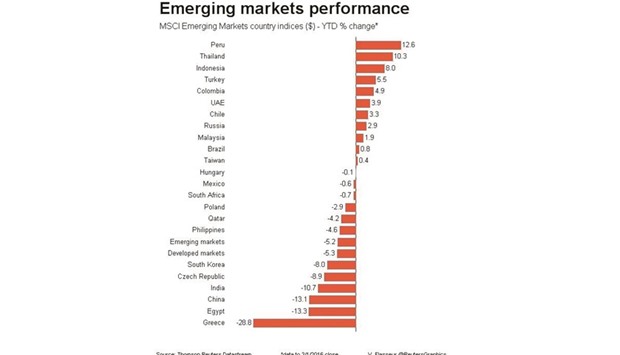Emerging equities touched two-month highs yesterday, posting their biggest one-day gain since mid-February, as a data uptick in developed countries overshadowed weak indicators within the emerging world.
MSCI’s emerging equity index rose 1.9% for their fourth straight day in the black. They tracked world markets which rose strongly as positive data from Australia to the US calmed fears of a global slowdown.
A 4% jump in Chinese mainland shares - their best day in four months - led gains despite ratings agency Moody’s cutting its China outlook to negative. Hong Kong shares rose 3% to seven-week highs.
While Moody’s cited uncertainty over China’s capacity to implement economic reforms, rising government debt and falling reserves, investors took their cue from stimulus measures, after a cut in banks’ reserve requirements earlier this week.
Most other Asian bourses rose too, with India up 1.8%.
The bullishness stretched into emerging Europe where Turkish stocks rose 1.2% to their highest since early December, whilst Budapest rose 1.1% to one-month highs. South African stocks climbed 1.4% to their highest since early January.
Analysts noted however that the rises came against the backdrop of poor data out of emerging markets this week, most notably weak Chinese business surveys.
South Korean stocks, touched two-month highs, despite a fall in January factory output. That makes a continuing rally vulnerable, analysts said. “It is still very fragile,” said Guillaume Tresca, senior emerging markets strategist at Credit Agricole. “I remain very cautious regarding this rally as there is no fundamental reason behind it.”
He added that a strong US non-farm payrolls number on Friday could fuel expectations of more rate rises from the Federal Reserve, which was likely to have a negative impact on emerging market assets.
Currencies’ performance was more mixed. Asian currencies firmed, with the Indonesian rupiah touching a four-and-a-half month high against the dollar.
The Polish zloty touched a nine-week high against the euro, with deputy prime minister Mateusz Morawiecki saying the stability of the zloty would be maintained.
But the rand slipped 1% against the dollar, feeling the impact of disappointing fourth quarter growth data, released on Tuesday. It had firmed on Tuesday after President Jacob Zuma denied a rift with the finance minister.
The Russian rouble slipped 0.8% off seven-week highs as oil’s price rally stalled.
On bonds, sovereign emerging dollar bonds’ yield premium to Treasuries touched new six-week lows of 467 basis points (bps). Traders expect new issuance if the market rally continues, with Turkish bank Yapi Credit on Tuesday launching a $500mn bond at 8.625%, 12.5 bps tighter than initial guidance.

